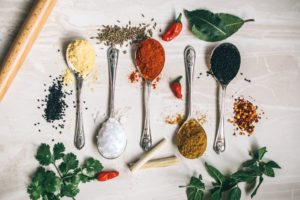 Looking to ramp up the flavor in your cooking? Reach for the spice rack the next time you’re in the kitchen. Not only will you add flavor to your food, but you’ll also boost your health in the process. Here are some herbs and spices that are great flavor enhancers and offer some unexpected health benefits.
Looking to ramp up the flavor in your cooking? Reach for the spice rack the next time you’re in the kitchen. Not only will you add flavor to your food, but you’ll also boost your health in the process. Here are some herbs and spices that are great flavor enhancers and offer some unexpected health benefits.
- Turmeric
This golden spice gets a gold medal. It may be the most effective nutritional supplement in existence with its abundant benefits for both the body and the brain. Curcumin, a very strong antioxidant with powerful anti-inflammatory properties, is the active ingredient in turmeric. According to studies, turmeric’s high concentrations of curcumin may help treat a variety of health problems ranging from minor toothaches to chronic conditions such as arthritis, heart disease and diabetes. Researchers are also studying the use of turmeric and it potential uses in the treatment of Alzheimer’s disease and various cancers. - Ginger
Ginger is known for helping to soothe nausea. According to a study in Supportive Care in Cancer, participants who were undergoing chemotherapy experienced significantly less nausea and vomiting immediately after treatment when taking ginger three days before and three days after chemotherapy treatment. Ginger is also packed with gingerols, which are inflammatory fighting compounds which may help fight some cancers, reduce arthritis pain, and soothe sore muscles. - Cayenne Pepper
Give your food a kick. The hot, spicy taste of cayenne pepper comes from capsaicin, a compound found in many hot peppers. Research suggests that after consuming foods with capsaicin, the body’s metabolic rate can increase by 15 to 20 percent for up to two hours. Another effect of the capsaicin found in cayenne is appetite suppression. Using a little cayenne in your cooking may be enough to help cut your cravings for fatty, salty and sweet foods. - Cinnamon
Cinnamon is great because it is sweet, low in calories and sugar-free. It is easy to find, inexpensive to buy and can be added to many things including your daily cup of coffee or tea. Cinnamon has been shown to help with inflammation, fight bacteria and fend off free radicals that can damage your cells. Research suggests that it can help lower blood sugar. This could be good news for diabetics, however this research is still in its early stages and more testing is necessary. It is important to keep in mind that eating cinnamon is no substitute for healthy eating habits, regular exercise and for diabetics, blood sugar monitoring and sometimes diabetes medications or insulin therapy. - Garlic
Garlic may protect your heart from changes leading to heart disease. Some researchers have linked garlic intake with reducing cholesterol and triglyceride levels. Again, it is important to note that there is still a great deal of conflicting research on garlic and its effectiveness on cholesterol. Until more studies are conducted, it would not be advisable to rely solely on garlic to lower your cholesterol. - Peppermint
Peppermint may be linked to improved mood and focus. As part of a study at Northumbria University in Newcastle, United Kingdom, 180 volunteers to consume either chamomile or peppermint tea and a control group drank hot water for comparison. Their mood and cognition were tested before and after drinking the tea. They found that peppermint enhanced both mood and cognition, helping to improve long term memory, working memory and alertness while chamomile had an opposite effect causing calmness, and a more sedative effect, significantly slowing memory and attention speed. - Oregano
Oregano contains many nutrients including vitamins K and E, calcium, iron, manganese and fiber as well as high levels of antioxidants. An analysis by the American Chemical Society found that one tablespoon of fresh oregano has as much antioxidant activity as a medium apple and 20 times more antioxidant power than many other herbs and four times more than blueberries which are highly touted for their rich antioxidant stores. - Rosemary
This fragrant and flavorful herb which is a member of the mint family is rich in antioxidants. Just smelling it has shown better performance on memory tests and other metal tasks. Researchers think one of its compounds called 1, 8-cineole may boost brain activity. A study from the Journal of Medicinal Food suggests that even small amounts in cooking may help prevent cognitive decline in older people.
Some herbs and spices are sold as supplements, but unless your doctor recommends otherwise it is best to eat them in your food instead of taking them in pill form. There are not many regulations around supplements and little government oversight, so a capsule may not have the amount of the substance it claims to or may even have unhealthy additives.
“Cooking with herbs and spices offers a lot of health benefits, including providing antioxidants and phytochemicals,” says Nicole Drepaniotis MS, RD, of the Medical Weight Management Program at Mather Hospital. “Each herb and spice has unique flavor and health properties. Experiment, add variety, and jazz up what you are cooking…do it for the taste and your health!” Drepaniotis says.
